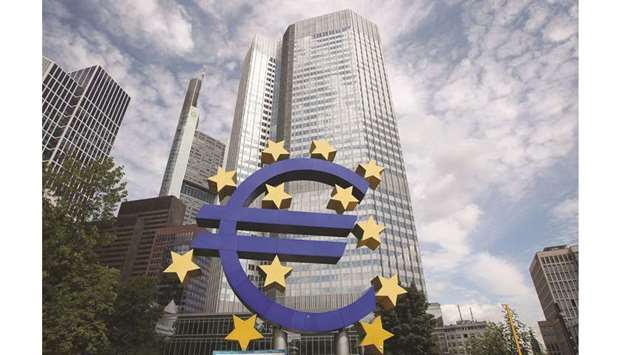European stock markets were mostly higher yesterday after the European Central Bank left its key borrowing rates unchanged — as expected — at its regular policy meeting.
Stock prices in London, Frankfurt and Paris all held on to their gains even after the ECB warned about the “downside risks” to the eurozone economy.
“Though not as positive as their UK peer, the DAX and CAC waved off (ECB chief) Mario Draghi,” said Spreadex analyst Connor Campbell.
London’s blue-chip FTSE100 index closed around 0.9% higher at 7,328.25 points as the pound weakened due to traders’ nervousness about Brexit.
Frankfurt’s DAX 30 closed 0.6% up at 12,872.10 points and Paris’ CAC 40 ended 0.6% higher at 5,684.33 points, while the EURO STOXX 50 finished 0.4% up at 3,621.37 points.
In Frankfurt, at his final meeting after eight years in office as ECB president, Draghi warned about the “prolonged presence of uncertainties” weighing on economic activity.
Nevertheless, the ECB chose to hold its fire for now and not to lower borrowing rates any further, even if Draghi said that “an ample degree of monetary policy accommodation is still necessary.”
“As expected, Mario Draghi’s last meeting as ECB president did not bring any meaningful news in terms of monetary policy,” said UniCredit analyst Marco Valli.
“Draghi confirmed a downbeat economic assessment” and his successor Christine Lagarde “will inherit a monetary policy that is likely to be on autopilot for some time,” he said.
Among the other European markets, Helsinki was in the red as shares in Nokia plunged more than 20% after the Finnish telecommunications equipment maker posted a profit warning.
“Draghi is in a situation where bond yields are higher and the collapse we saw over the summer is reversing, the euro has steadied itself and everything is fine, except for the PMIs of course,” said Societe Generale’s Kit Juckes. “And he’s handing over an empty monetary policy toolkit.”
Germany’s export-dependent manufacturing sector also remained in contraction, suggesting a third-quarter slowdown in Europe’s largest economy could stretch into the closing months of the year.
“Things are really not getting any better yet.
A slight improvement in October PMIs can’t mask the fact that growth has almost stalled.
The overall picture is one of a feeble economy,” said Bert Colijn at ING.
The data had also knocked the wind out of the euro after it had started the day brightly, but bond yields were broadly steady and there were plenty of other things going on too.
The Swedish crown rose 0.7% after its central bank stuck with plans to raise its interest rates in December.
Its gains pulled the Norwegian crown higher as well, despite a relatively dovish message from the Norges Bank which left its rates unchanged.
On the other side of the Atlantic, Wall Street was mixed amid optimism over US-China trade talks and as Tesla surged on positive earnings, while Twitter plunged on disappointing results.
The euro meanwhile dipped against the dollar following poorly-received eurozone manufacturing data.
The pound dropped versus the dollar and euro as traders waited to see by how long the European Union would decide to extend Brexit beyond the current October 31 deadline.
With traders’ attention firmly on the current earnings season, shares in Airbus jumped in Paris after the European plane maker said Spirit Airlines intended to buy up to 100 of its A320neo family aircraft.
With the euro treading water, The Japanese yen was 0.1% higher at 108.6 per dollar and the Australian dollar was weaker at $0.6842.
The dollar index was lower at 97.452 against a basket of six major currencies, heading for its worst month since January 2018.
In commodity markets, oil steadied above $61 a barrel on as concern over the demand outlook offset a surprise drop in US crude inventories and the prospect of further action by Opec and its allies to support the market.
Brent crude was unchanged at $61.17 a barrel, having jumped 2.5% on Wednesday.
US West Texas Intermediate (WTI) crude was down 10 cents at $55.87 and gold barely budged at $1,491.50 an ounce.

The European Central Bank in Frankfurt. The ECB yesterday chose to hold its fire for now and not to lower borrowing rates any further, even though its president Mario Draghi said that u201can ample degree of monetary policy accommodation is still necessary.u201d
